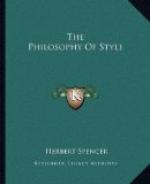3. On seeking for some clue to the law underlying these current maxims, we may see shadowed forth in many of them, the importance of economizing the reader’s or hearer’s attention, To so present ideas that they may be apprehended with the least possible mental effort, is the desideratum towards which most of the rules above quoted point. When we condemn writing that is wordy, or confused, or intricate—when we praise this style as easy, and blame that as fatiguing, we consciously or unconsciously assume this desideratum as our standard of judgment. Regarding language as an apparatus of symbols for the conveyance of thought, we may say that, as in a mechanical apparatus, the more simple and the better arranged its parts, the greater will be the effect produced. In either case, whatever force is absorbed by the machine is deducted from the result. A reader or listener has at each moment but a limited amount of mental power available. To recognize and interpret the symbols presented to him, requires part of this power; to arrange and combine the images suggested requires a further part; and only that part which remains can be used for realizing the thought conveyed. Hence, the more time and attention it takes to receive and understand each sentence, the less time and attention can be given to the contained idea; and the less vividly will that idea be conceived.
4. How truly language must be regarded as a hindrance to thought, though the necessary instrument of it, we shall clearly perceive on remembering the comparative force with which simple ideas are communicated by signs. To say, “Leave the room,” is less expressive than to point to the door. Placing a finger on the lips is more forcible than whispering, “Do not speak.” A beck of the hand is better than, “Come here.” No phrase can convey the idea of surprise so vividly as opening the eyes and raising the eyebrows. A shrug of the shoulders would lose much by translation into words. Again, it may be remarked that when oral language is employed, the strongest effects are produced by interjections, which condense entire sentences into syllables. And in other cases, where custom allows us to express thoughts by single words, as in Beware, Heigho, Fudge, much force would be lost by expanding them into specific propositions. Hence, carrying out the metaphor that language is the vehicle of thought, there seems reason to think that in all cases the friction and inertia of the vehicle deduct from its efficiency; and that in composition, the chief, if not the sole thing to be done, is, to reduce this friction and inertia to the smallest possible amount. Let us then inquire whether economy of the recipient’s attention is not the secret of effect, alike in the right choice and collocation of words, in the best arrangement of clauses in a sentence, in the proper order of its principal and subordinate propositions, in the judicious use of simile, metaphor, and other figures of speech, and even in the rhythmical sequence of syllables.




